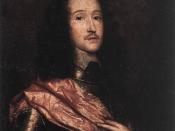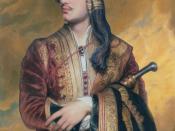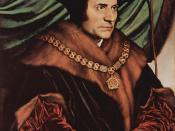Freedom???
Freedom is a state of mind and is a choice. It cannot be taken away from somebody if they are in shackles or in jail. Freedom means different things to different people. Different people would also put their life on the line as long as they have freedom. Sir Thomas More in A Man for All Seasons, Richard Lovelace in "To Althea", and Lord Byron in "The Prisoner of Chillon, all have different perspectives on what freedom is and what they would do if freedom was tried to be taken away from them.
Thomas More believes that freedom is sticking up for what one believes in. He thinks that is the difference between an animal and a human. Humans have freedom of speech. Thomas More ultimately gets put to death because he did not approve of King Henry's divorce with Queen Catherine of Aragon. He wanted to give in and say that the king could get a divorce, but he knew that his conscience would haunt him for the rest of his life.
He even offered for his arm to be amputated if his conscience would not eat at him. "There is my arm. Take your dagger and saw it from my shoulder, and I will laugh and be thankful, if by that means I can come with your grace with a clear conscience." He goes to an extreme. He believes it is worth it to give up his life and stand up for what he believes in. That is true freedom according to him.
Richard Lovelace in "To Althea" believes that freedom is to love. Loving his King and his woman Althea meant freedom. "When I lie tangled in her air, and fettered to her eye; The G-ds that wanton in the air know no such liberty." Even...


